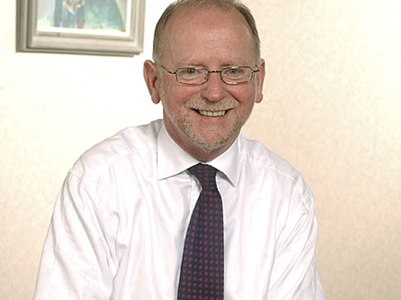The Head of the Civil Service, Sir Bruce Robinson, has responded to claims that he has not met with the Public Appointments Commissioner in almost three years by saying that they have met informally each year, at the OFMDFM Christmas carol Service.
Sir Bruce also claimed that he had received only one “formal request” for a meeting with him from Felicity Huston which took place shortly after his appointment – although The Detail has had sight of correspondence which would appear to contradict this.
The response from Sir Bruce followed an interview carried out with Mrs Huston by The Detail a matter of weeks before she steps down from the role in which she described her uphill battles with the Civil Service throughout her six-year tenure.
She also said she has contacted Sir Bruce on numerous occasions to try to arrange an official meeting but that her repeated requests had been ignored.
“I asked to see him when he was first appointed and we met and I’ve asked, or suggested, frequently since then that we should meet to talk about things, like I did with his predecessor, but that meeting hasn’t taken place which is a bit of a shame.”
In a letter to The Detail responding to some of the issues raised by Mrs Huston, Sir Bruce stated that to protect the independence of her office, the OFMDFM conducted its relationship with her in line with an agreed memorandum of understanding which provided for meetings with more junior staff.
He said he had been and continued to be in regular contact by correspondence with Mrs Huston.
He added: “In addition, I have met the Commissioner each year informally at the OFMDFM Christmas Carol Service.”
Sir Bruce also said that Mrs Huston had only made one formal request to meet with him since his appointment in 2008; however The Detail has seen three letters addressed to Sir Bruce – carrying dates in May 2009, September 2009 and February 2010 – in which Mrs Huston requests to meet with him.
Meanwhile Mrs Huston has also disputed the rationale offered by Sir Bruce for the decision by OFMDFM to cut the working hours of the person who succeeds her.
Last week Mrs Huston disclosed that there had been no contact from the OFMDFM about the recruitment of her successor.
“I have had absolutely no contact whatsoever; I got a letter to tell me that they would be advertising the post so at least that was something. But no contact at all.”
She added: “For a public body that I would have regulation of I would recommend that they would speak to the outgoing chair of a body, or the current chair before they draw up a job specification for a post for a public appointment so that they understand what the post requires.”
Sir Bruce said in his letter to The Detail that it was “not considered necessary to consult with the outgoing Commissioner”.
“The recruitment and selection process for the Commissioner’s successor reflects the statutory requirements of the Office and follows the key principles of the Commissioner’s Code of Practice.”
According to Sir Bruce, the skills and experience required for the role had not changed since 1995, when the Commissioner for Public Appointments (Northern Ireland) Order was set up.
The new Commissioners post was advertised in March this year as a day and a half, a reduction from the two days Mrs Huston currently works. Sir Bruce told The Detail this was because of ‘a reducing trend in Public Appointments’.
However Mrs Huston has rejected that claim and said that the number of bodies she is regulating has increased and that this indicates “a fundamental lack of understanding of the role”.
“We are not running an exercise in statistics. We are regulating a system across all 11 government departments where each department has its own way of doing things and many sections within those departments also have their own methods. In any one day I can be dealing with queries regarding bodies as diverse as NI Film and Afbi.
She added: “In April 2010 we took on the regulation of the NIO public appointments which came to the DOJ, 9 substantive bodies and a further 8 advisory ones – including e.g. the Policing Board and the Police Ombudsman. Did any other section of the local administration have its staffing cut as a result of work received from the devolution of policing and justice?”
During her time as Public Appointments Commissioner Mrs Huston says she has had difficulty asserting her independence in her role. Her offices were initially located in Castle Buildings – the heart of the Civil Service – before she took up residence in a temporary building beside Dundonald House.
She believes that the Civil Service struggles with the idea of independence and transparency in the public sector.
“I do at least have premises outside the NI Civil Service now, but I don’t have my own independent budget, these are all indicators of independence, internationally recognised indicators of independence and this office doesn’t have them.
She added: “I genuinely think the Civil Service couldn’t see what the problem was and I think it reflects further into things in my post, they don’t understand what the difficulty is and why does it matter if your staff are civil servants? I used to have an email address and website that was just an extension of OFM/DFM. They genuinely don’t get it.”
